学位英语挑错技巧
学位英语考试答题技巧

学位英语考试答题技巧
嘿,咱就说说学位英语考试答题技巧呗。
这学位英语考试啊,可得有点小窍门。
先说选择题,碰到不会的可别瞎蒙。
先看看题干,找找关键词。
要是有那种长得很像正确答案的选项,就多琢磨琢磨。
就跟挑苹果似的,得挑个顺眼的。
实在不会了,就用排除法,把肯定不对的先去掉,剩下的再蒙一个,说不定就蒙对了呢。
阅读理解可不能瞎读。
先看题目,知道问啥了再去文章里找答案。
就像找宝藏似的,有目标地找。
读文章的时候也别一个字一个字地看,那多慢呐。
快速浏览,抓住关键信息。
看到和题目有关的地方就仔细看看,答案说不定就在那。
写作也有技巧。
开头得吸引人,就像唱戏开场得热闹一样。
中间内容得有条理,别东一榔头西一棒槌的。
结尾也得漂亮,让人印象深刻。
要是能用上几个好句子,那可就更好了。
就跟打扮自己似的,得把文章打扮得漂漂亮亮的。
咱打个比方哈,这考试就像打仗,得有策略。
咱举个例子哈。
俺们村有个小李,他要考学位英语。
一
开始他可紧张了,不知道咋考。
后来他听了别人的建议,用了这些答题技巧。
考试的时候,他不慌不忙,选择题用排除法,阅读理解有目标地找答案,写作也写得挺不错。
最后他顺利通过了考试。
从那以后,小李就觉得这答题技巧还真管用。
这学位英语考试答题技巧啊,咱可得好好掌握。
要是咱也考学位英语,就可以试试这些办法。
大理大学学士学位英语考试解读
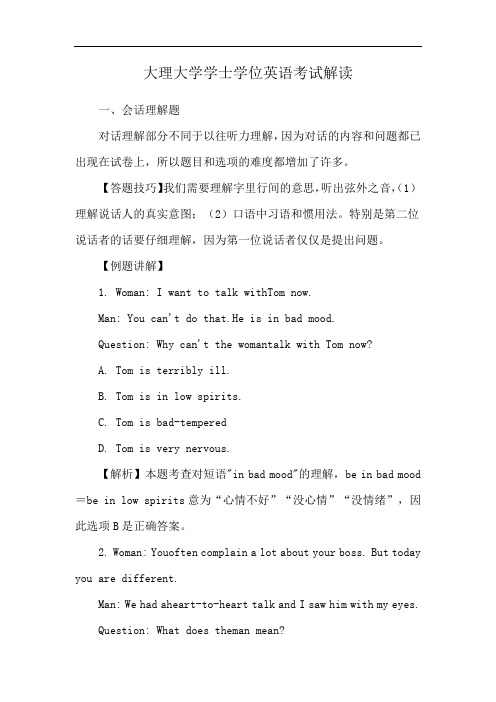
大理大学学士学位英语考试解读一、会话理解题对话理解部分不同于以往听力理解,因为对话的内容和问题都已出现在试卷上,所以题目和选项的难度都增加了许多。
【答题技巧】我们需要理解字里行间的意思,听出弦外之音,(1)理解说话人的真实意图;(2)口语中习语和惯用法。
特别是第二位说话者的话要仔细理解,因为第一位说话者仅仅是提出问题。
【例题讲解】1. Woman: I want to talk withTom now.Man: You can't do that.He is in bad mood.Question: Why can't the womantalk with Tom now?A. Tom is terribly ill.B. Tom is in low spirits.C. Tom is bad-temperedD. Tom is very nervous.【解析】本题考查对短语"in bad mood"的理解,be in bad mood =be in low spirits意为“心情不好”“没心情”“没情绪”,因此选项B是正确答案。
2. Woman: Youoften complain a lot about your boss. But today you are different.Man: We had aheart-to-heart talk and I saw him with my eyes.Question: What does theman mean?A. Hesaw his boss as a real person for the first time.B. Heis now complaining in a different way.C. Hehas made his boss change his attitude.D. Hehas changed his opinion of his boss.【解析】本题考查对男方回答的隐含理解。
成人学位英语考试各题型答题技巧
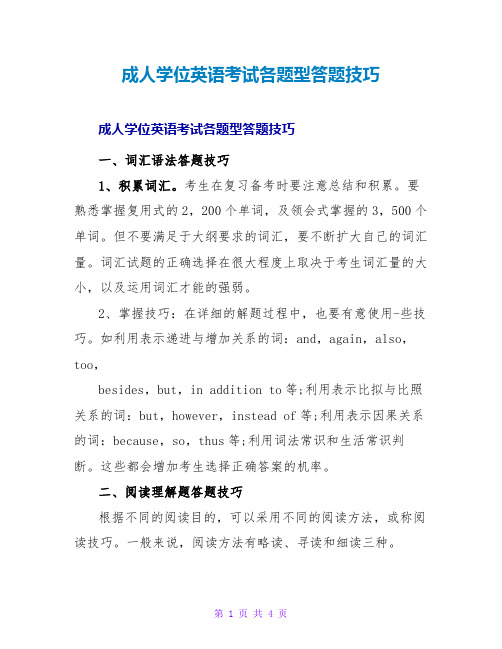
成人学位英语考试各题型答题技巧成人学位英语考试各题型答题技巧一、词汇语法答题技巧1、积累词汇。
考生在复习备考时要注意总结和积累。
要熟悉掌握复用式的2,200个单词,及领会式掌握的3,500个单词。
但不要满足于大纲要求的词汇,要不断扩大自己的词汇量。
词汇试题的正确选择在很大程度上取决于考生词汇量的大小,以及运用词汇才能的强弱。
2、掌握技巧:在详细的解题过程中,也要有意使用-些技巧。
如利用表示递进与增加关系的词:and,again,also,too,besides,but,in addition to等;利用表示比拟与比照关系的词:but,however,instead of等;利用表示因果关系的词:because,so,thus等;利用词法常识和生活常识判断。
这些都会增加考生选择正确答案的机率。
二、阅读理解题答题技巧根据不同的阅读目的,可以采用不同的阅读方法,或称阅读技巧。
一般来说,阅读方法有略读、寻读和细读三种。
“略读”又称“阅读”,是指跳过细节,跳过不重要的.描绘与例子,进展快速阅读以求抓住文章的大意和主题思想的方法。
“寻读”是快速寻找某一特殊信息的阅读方法。
它的目的非常明确,即找到所需要的信息。
“细读”是在找到文章中的有关局部以后,在此范围内逐句阅读,特别要对【关键词】:^p 、句仔细琢磨,以便对其有比拟深入、准确的理解。
不仅要理解其字面意思,还要通过推理和判断,弄清文章中字里行间所隐含的意思。
在细读的过程中,对没有学过的生词,可根据上下文的背景知识来推测其词义;对难以看懂的长句,可借助语法手段,对其加以分析^p ,以到达正确理解的目的。
三、英译汉答题技巧(1)可以直译尽量不意译;(2)坚持形式与内容的统一;(3)翻译时既要忠实于原文,又要符合汉语的习惯。
(4)保证译文的准确、通顺,不遗漏【关键词】:^p 的采分点。
四、挑错题解题技巧主要是理解挑错题的命题规律,把握常见错误类型分析^p 。
常见错误类型主要有用词错误和语法错误。
学位英语考试挑错题复习资料:答题策略

学位英语考试挑错题复习资料:答题策略
学位英语考试挑错题复习资料:答题策略
在做题时首先要读懂全句的意思,不要只读句子中划线的部分,
一边读一边带着找问题的眼光去看:
(1)句子的主、谓语单复数是否一致;
(2)名词和代词的人称、数和格是否准确;代词的指代、反身代词、物主代词和名词性物主代词用的是否准确;
(3)动词的时态、语态是否准确;
(4)句子各个部分之间以及句子与句子之间连接的关联词是否准确;
(5)形容词和副词以及它们的比较级形式是否准确;
(6)非谓语动词(不定式、动名词以及分词)的用法是否准确;
(7)虚拟语气的构成和用法是否准确;
(8)各类从句的构成和用法是否准确;
(9)强调句型的结构和用法是否准确;
(10)倒装的结构和用法是否准确。
成人继续教育学位英语答题技巧
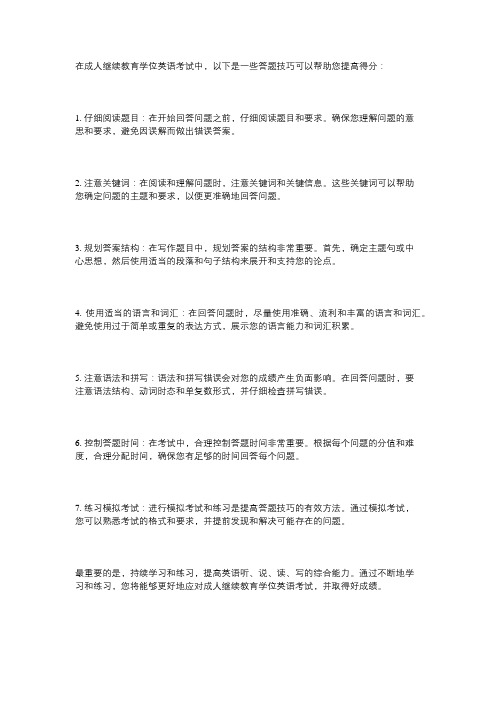
在成人继续教育学位英语考试中,以下是一些答题技巧可以帮助您提高得分:
1. 仔细阅读题目:在开始回答问题之前,仔细阅读题目和要求。
确保您理解问题的意
思和要求,避免因误解而做出错误答案。
2. 注意关键词:在阅读和理解问题时,注意关键词和关键信息。
这些关键词可以帮助
您确定问题的主题和要求,以便更准确地回答问题。
3. 规划答案结构:在写作题目中,规划答案的结构非常重要。
首先,确定主题句或中
心思想,然后使用适当的段落和句子结构来展开和支持您的论点。
4. 使用适当的语言和词汇:在回答问题时,尽量使用准确、流利和丰富的语言和词汇。
避免使用过于简单或重复的表达方式,展示您的语言能力和词汇积累。
5. 注意语法和拼写:语法和拼写错误会对您的成绩产生负面影响。
在回答问题时,要
注意语法结构、动词时态和单复数形式,并仔细检查拼写错误。
6. 控制答题时间:在考试中,合理控制答题时间非常重要。
根据每个问题的分值和难度,合理分配时间,确保您有足够的时间回答每个问题。
7. 练习模拟考试:进行模拟考试和练习是提高答题技巧的有效方法。
通过模拟考试,
您可以熟悉考试的格式和要求,并提前发现和解决可能存在的问题。
最重要的是,持续学习和练习,提高英语听、说、读、写的综合能力。
通过不断地学
习和练习,您将能够更好地应对成人继续教育学位英语考试,并取得好成绩。
成人本科学士学位英语考试挑错部分题型分析及解题技巧
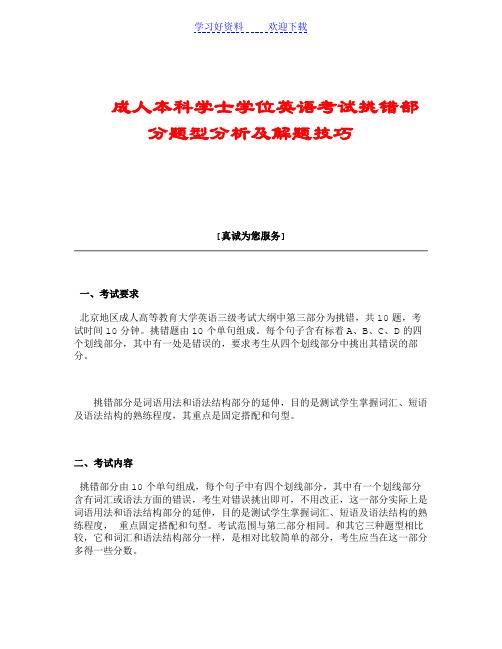
成人本科学士学位英语考试挑错部分题型分析及解题技巧[真诚为您服务]一、考试要求北京地区成人高等教育大学英语三级考试大纲中第三部分为挑错,共10题,考试时间10分钟。
挑错题由10个单句组成。
每个句子含有标着A、B、C、D的四个划线部分,其中有一处是错误的,要求考生从四个划线部分中挑出其错误的部分。
挑错部分是词语用法和语法结构部分的延伸,目的是测试学生掌握词汇、短语及语法结构的熟练程度,其重点是固定搭配和句型。
二、考试内容挑错部分由10个单句组成,每个句子中有四个划线部分,其中有一个划线部分含有词汇或语法方面的错误,考生对错误挑出即可,不用改正,这一部分实际上是词语用法和语法结构部分的延伸,目的是测试学生掌握词汇、短语及语法结构的熟练程度,重点固定搭配和句型。
考试范围与第二部分相同。
和其它三种题型相比较,它和词汇和语法结构部分一样,是相对比较简单的部分,考生应当在这一部分多得一些分数。
三、题型分析3.1.用词错误? 固定搭配方面的错误:固定搭配的错误主要是指包括动词、形容词、名词与介词的搭配以及固定搭配、惯用法等等。
主要错误类型常常有:动词词组的固定搭配;连词的固定搭配;一些语法结构的固定搭配;惯用法的错误。
例1、Neither you nor I, and anybody else knows the answer. AB CD【答案】:C【解析】:neirher…nor…(即不…也不…),是固定搭配。
所以C是正确答案,改为“nor anybody” 译文:你, 我, 其他任何人都不知道这答案。
例2、My friend looked for my cat while I wason holiday.AB C D【答案】:A【解析】:应改为“looked after”意思是“照看” 。
译文:在我去度假的时候,我的朋友照料我的猫。
例3、If either David nor Janet come, they will want a drink.A B CD【答案】:B【解析】:应改为“or”,either…or…是固定搭配,意思是“或是…或是…” 。
学位英语挑错练习题解题方法
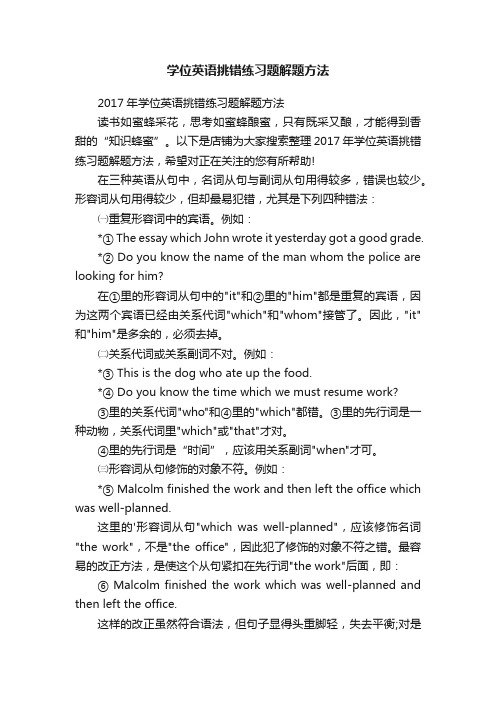
学位英语挑错练习题解题方法2017年学位英语挑错练习题解题方法读书如蜜蜂采花,思考如蜜蜂酿蜜,只有既采又酿,才能得到香甜的“知识蜂蜜”。
以下是店铺为大家搜索整理2017年学位英语挑错练习题解题方法,希望对正在关注的您有所帮助!在三种英语从句中,名词从句与副词从句用得较多,错误也较少。
形容词从句用得较少,但却最易犯错,尤其是下列四种错法:㈠重复形容词中的宾语。
例如:*① The essay which John wrote it yesterday got a good grade.*② Do you know the name of the man whom the police are looking for him?在①里的形容词从句中的"it"和②里的"him"都是重复的宾语,因为这两个宾语已经由关系代词"which"和"whom"接管了。
因此,"it"和"him"是多余的,必须去掉。
㈡关系代词或关系副词不对。
例如:*③ This is the dog who ate up the food.*④ Do you know the time which we must resume work?③里的关系代词"who"和④里的"which"都错。
③里的先行词是一种动物,关系代词里"which"或"that"才对。
④里的先行词是“时间”,应该用关系副词"when"才可。
㈢形容词从句修饰的对象不符。
例如:*⑤ Malcolm finished the work and then left the office which was well-planned.这里的'形容词从句"which was well-planned",应该修饰名词"the work",不是"the office",因此犯了修饰的对象不符之错。
学位英语考试挑错题考试技巧
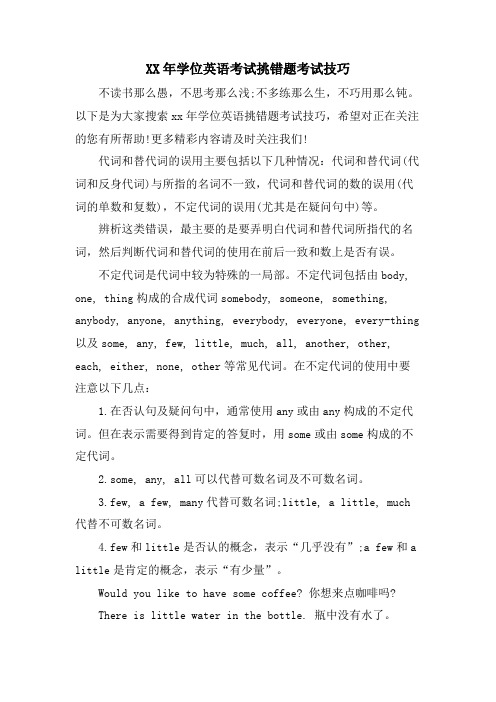
XX年学位英语考试挑错题考试技巧不读书那么愚,不思考那么浅;不多练那么生,不巧用那么钝。
以下是为大家搜索xx年学位英语挑错题考试技巧,希望对正在关注的您有所帮助!更多精彩内容请及时关注我们!代词和替代词的误用主要包括以下几种情况:代词和替代词(代词和反身代词)与所指的名词不一致,代词和替代词的数的误用(代词的单数和复数),不定代词的误用(尤其是在疑问句中)等。
辨析这类错误,最主要的是要弄明白代词和替代词所指代的名词,然后判断代词和替代词的使用在前后一致和数上是否有误。
不定代词是代词中较为特殊的一局部。
不定代词包括由body, one, thing构成的合成代词somebody, someone, something, anybody, anyone, anything, everybody, everyone, every-thing 以及some, any, few, little, much, all, another, other, each, either, none, other等常见代词。
在不定代词的使用中要注意以下几点:1.在否认句及疑问句中,通常使用any或由any构成的不定代词。
但在表示需要得到肯定的答复时,用some或由some构成的不定代词。
2.some, any, all可以代替可数名词及不可数名词。
3.few, a few, many代替可数名词;little, a little, much 代替不可数名词。
4.few和little是否认的概念,表示“几乎没有”;a few和a little是肯定的概念,表示“有少量”。
Would you like to have some coffee? 你想来点咖啡吗?There is little water in the bottle. 瓶中没有水了。
代词的主要功能是指代已出现的名词、词组或一个意群,因此代词的出现必须有所指,而且形、数等必须与前面所代的部份相符。
学位英语挑错技巧
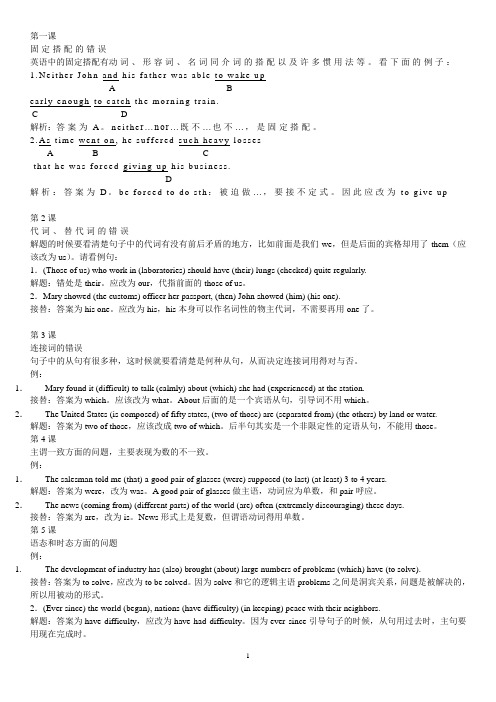
固定搭配的错误英语中的固定搭配有动词、形容词、名词同介词的搭配以及许多惯用法等。
看下面的例子:1.N e it h e r J o h n a n d h is f a t h e r w a s a b le t o w a k e u pA Be a r ly e n o u g h t o c a tc h t h e m o r n in g t r a in.C D解析:答案为A。
n e it h e r…n o r…既不…也不…,是固定搭配。
2.As t im e w e n t o n,h e s u ff e r e d s u c h h e a v y lo s s esA B Ct h a t h e w a s f or c e d g iv in g u p h is b u s in e s s.D解析:答案为D。
b e f o rc e d t o d o s t h:被迫做…,要接不定式。
因此应改为t o g iv e u p第2课代词、替代词的错误解题的时候要看清楚句子中的代词有没有前后矛盾的地方,比如前面是我们we,但是后面的宾格却用了them(应该改为us)。
请看例句:1.(Those of us) who work in (laboratories) should have (their) lungs (checked) quite regularly.解题:错处是their。
应改为our,代指前面的those of us。
2.Mary showed (the customs) officer her passport, (then) John showed (him) (his one).接替:答案为his one。
应改为his,his本身可以作名词性的物主代词,不需要再用one了。
第3课连接词的错误句子中的从句有很多种,这时候就要看清楚是何种从句,从而决定连接词用得对与否。
学位英语单选技巧

学位英语单选技巧
学位英语考试中的单项选择题,作为一种常见的题型,旨在测试考生对英语语法、词汇和固定搭配的掌握程度。
以下是一些建议,帮助考生提高单选题的正确率:仔细阅读题干:在做单选题时,首先要仔细阅读题干,确保理解题目的意思。
这有助于你判断题目考查的知识点,从而作出正确的选择。
分析选项:分析每个选项的含义,注意辨别同义词、近义词之间的细微差别。
有时候,正确答案可能隐藏在看似相似的选项中,需要你仔细辨别。
利用排除法:当你不确定正确答案时,可以尝试使用排除法。
先排除那些明显错误的选项,然后再在剩下的选项中进行选择。
这样可以缩小选择范围,提高正确率。
注意固定搭配:英语中有很多固定搭配,这些搭配在单选题中经常出现。
因此,熟悉这些固定搭配对于提高单选题的正确率很有帮助。
建议在学习过程中多积累、总结这些固定搭配。
结合语境判断:有时候,单选题的答案需要结合具体的语境来判断。
在做题时,要充分利用题干提供的语境信息,结合自己的语言知识和经验来作出判断。
避免盲目猜测:虽然有时候猜测也是一种策略,但在做单选题时,尽量避免盲目猜测。
在没有充分依据的情况下,盲目猜测可能会降低你的正确率。
总之,提高学位英语单选题的正确率需要考生在平时的学习过程中不断积累、总结,掌握一定的解题技巧。
通过不断的练习和实践,相信你会在考试中取得理想的成绩。
2023年学位英语挑错考试题型解析及答案2

2023年学位英语挑错考试题型解析及答案2023年学位英语挑错考试题型解析及答案It is important that they be looking at the speaker at the precise moment when the speaker reestablishes eye contact: if they are not looking, the speaker assumes that they are disinterested and either will pause until eye contact is resumed or will terminate the conversation.And the limited investments that are made in training workers are also much more narrowly focused on the specific skills necessary to do the next job rather than on the basic background skills that make it possible to absorb new technologies.One can only guess that if he heard many of them he was only strengthened in his resolve not to allow himself and his bride to be made a spectacle nottheir live selves or their bodies要点分析和参考译文要点:根本句型“ It is important that......” ,that 主语从句的谓语为虚拟语气(be)。
学位英语阅读理解答题技巧
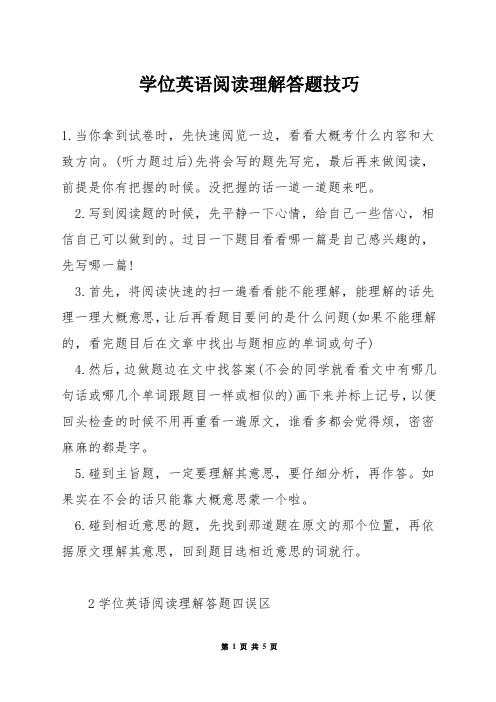
学位英语阅读理解答题技巧1.当你拿到试卷时,先快速阅览一边,看看大概考什么内容和大致方向。
(听力题过后)先将会写的题先写完,最后再来做阅读,前提是你有把握的时候。
没把握的话一道一道题来吧。
2.写到阅读题的时候,先平静一下心情,给自己一些信心,相信自己可以做到的。
过目一下题目看看哪一篇是自己感兴趣的,先写哪一篇!3.首先,将阅读快速的扫一遍看看能不能理解,能理解的话先理一理大概意思,让后再看题目要问的是什么问题(如果不能理解的,看完题目后在文章中找出与题相应的单词或句子)4.然后,边做题边在文中找答案(不会的同学就看看文中有哪几句话或哪几个单词跟题目一样或相似的)画下来并标上记号,以便回头检查的时候不用再重看一遍原文,谁看多都会觉得烦,密密麻麻的都是字。
5.碰到主旨题,一定要理解其意思,要仔细分析,再作答。
如果实在不会的话只能靠大概意思蒙一个啦。
6.碰到相近意思的题,先找到那道题在原文的那个位置,再依据原文理解其意思,回到题目选相近意思的词就行。
2学位英语阅读理解答题四误区误区一、阅读方法欠妥,喜爱字斟句酌,速度较慢许多学士学位英语考生在准备考试的过程中,把注意力集中在语法结构分析和单个词汇记忆上,从而忽视了阅读数量及阅读速度,导致在应试时慌乱,不知所云。
阅读时把精力集中在每个单词的含义上,一字一字地读,造成"只见树不见森林'的结果。
不会依据不同的题型采纳不同的阅读方法,从而影响了阅读速度和效果。
误区二、对生词的恐惧心理,碰到不熟悉的词语就心慌意乱许多同学在阅读中一碰到生词就暗徨恐惧心理,这样就影响了正常水平的发挥。
其实,在阅读测试中,考的并不是词汇,而是阅读技能,其中一个技能就是如何通过上下文线索以及构词法猜出,帮助考生理解文章大意。
即使有些词猜不出其意思,也不要紧,只要不影响答题就不必去管它。
误区三、对句与句,段与段之间的逻辑关系不重视许多考生对篇章句与句,段与段之间的逻辑关系及信号词不够重视,从而导致理解和答题的片面性,跟不上的思路,分不清文章的层次结构,抓不住段落要点,直接影响了考试成绩。
2015学位英语考试挑错题型答题对策
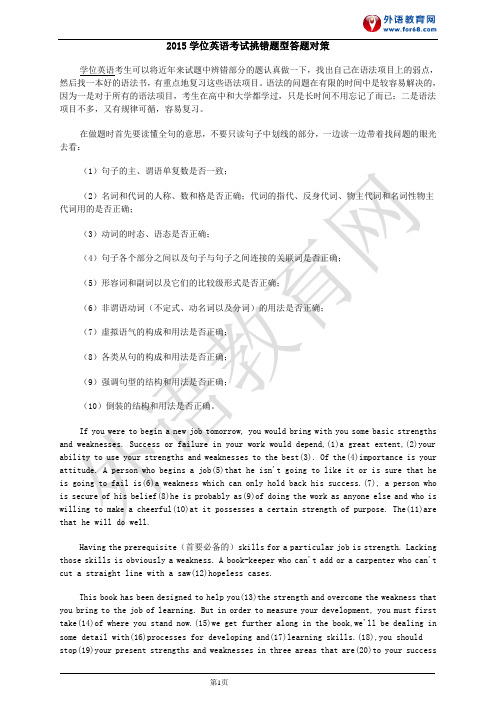
2015学位英语考试挑错题型答题对策学位英语考生可以将近年来试题中辨错部分的题认真做一下,找出自己在语法项目上的弱点,然后找一本好的语法书,有重点地复习这些语法项目。
语法的问题在有限的时间中是较容易解决的,因为一是对于所有的语法项目,考生在高中和大学都学过,只是长时间不用忘记了而已;二是语法项目不多,又有规律可循,容易复习。
在做题时首先要读懂全句的意思,不要只读句子中划线的部分,一边读一边带着找问题的眼光去看:(1)句子的主、谓语单复数是否一致;(2)名词和代词的人称、数和格是否正确;代词的指代、反身代词、物主代词和名词性物主代词用的是否正确;(3)动词的时态、语态是否正确;(4)句子各个部分之间以及句子与句子之间连接的关联词是否正确;(5)形容词和副词以及它们的比较级形式是否正确;(6)非谓语动词(不定式、动名词以及分词)的用法是否正确;(7)虚拟语气的构成和用法是否正确;(8)各类从句的构成和用法是否正确;(9)强调句型的结构和用法是否正确;(10)倒装的结构和用法是否正确。
If you were to begin a new job tomorrow, you would bring with you some basic strengths and weaknesses. Success or failure in your work would depend,(1)a great extent,(2)your ability to use your strengths and weaknesses to the best(3). Of the(4)importance is your attitude. A person who begins a job(5)that he isn't going to like it or is sure that he is going to fail is(6)a weakness which can only hold back his success.(7), a person who is secure of his belief(8)he is probably as(9)of doing the work as anyone else and who is willing to make a cheerful(10)at it possesses a certain strength of purpose. The(11)are that he will do well.Having the prerequisite(首要必备的)skills for a particular job is strength. Lacking those skills is obviously a weakness. A book-keeper who can't add or a carpenter who can't cut a straight line with a saw(12)hopeless cases.This book has been designed to help you(13)the strength and overcome the weakness that you bring to the job of learning. But in order to measure your development, you must first take(14)of where you stand now.(15)we get further along in the book,we'll be dealing in some detail with(16)processes for developing and(17)learning skills.(18),you should stop(19)your present strengths and weaknesses in three areas that are(20)to your successor failure in school: your attitude, your reading and communication skills,and your study habits.1. A.on B.for C.of D.toBest Answer: D详解:D)。
学位英语65条蒙题小技巧
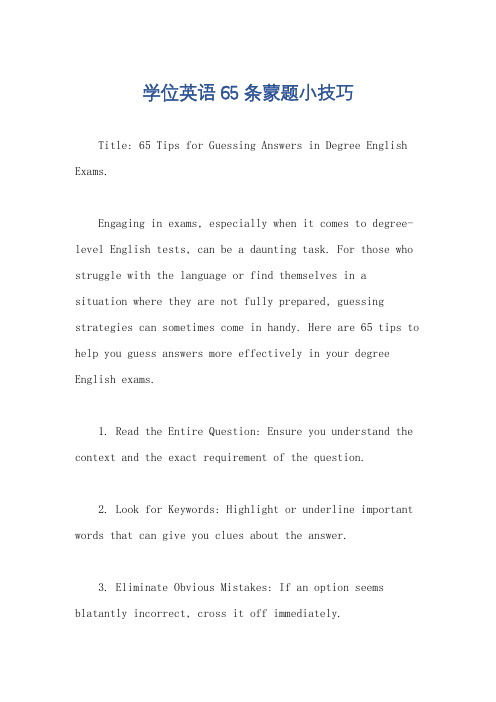
学位英语65条蒙题小技巧Title: 65 Tips for Guessing Answers in Degree English Exams.Engaging in exams, especially when it comes to degree-level English tests, can be a daunting task. For those who struggle with the language or find themselves in asituation where they are not fully prepared, guessing strategies can sometimes come in handy. Here are 65 tips to help you guess answers more effectively in your degree English exams.1. Read the Entire Question: Ensure you understand the context and the exact requirement of the question.2. Look for Keywords: Highlight or underline important words that can give you clues about the answer.3. Eliminate Obvious Mistakes: If an option seems blatantly incorrect, cross it off immediately.4. Use Your Common Sense: Apply logic and real-world knowledge to filter out implausible answers.5. Guess and Check: If you're stuck, make a guess and then verify it against the other options.6. Look for Patterns: Identify repeating themes or patterns in the options.7. Trust Your First Impression: Sometimes, your initial guess may be closer to the correct answer than you think.8. Use Process of Elimination: Cross off options that are clearly incorrect until you're left with a likely answer.9. Check for Contradictions: Look for answers that contradict each other and eliminate them.10. Guess Randomly: If all else fails, a random guess may still give you a one-in-four chance of getting it right.11. Read the Answer Choices Carefully: Pay attention to details like tense, grammar, and vocabulary.12. Find Synonyms: Look for words or phrases that mean the same as the question's keywords.13. Predict the Answer: Try to anticipate what the question is asking and choose the most relevant answer.14. Guess Based on Context: Use the surrounding text to infer the correct answer.15. Look for Familiar Phrases: Recognize familiar expressions or sayings that might guide you to the right answer.16. Utilize Your Intuition: Sometimes, a gut feeling can be surprisingly accurate.17. Guess the Opposite: If an option seems too obvious, consider its opposite.18. Focus on the Main Idea: Ignore minor details and focus on the core concept of the question.19. Think Outside the Box: Don't be afraid to choose an unconventional answer if it fits the context.20. Use a Dice: In a multiple-choice exam, a dice can help you randomly select an answer when you're clueless.21. Look for Patterns in the Question: Repetitive words or phrases might hint at the correct answer.22. Trust Your Instincts: If an answer feels right, go with it even if you're not sure why.23. Read the Entire Passage: Understanding the broader context can help you decipher tricky questions.24. Answer in Your Native Language First: Translate the question into your native language to clarify its meaning.25. Review Your Answers: After guessing, re-read the questions and answers to ensure consistency.26. Look for Clues in the Textbook: If you're allowed, refer to your textbooks for potential answers.27. Use a Coin: Flip a coin to randomly choose between two equally likely answers.28. Answer in Sequence: Start with easy questions and work your way up to the more difficult ones.29. Guess Based on the Teacher's Hints: Listencarefully for any clues your teacher might provide.30. Review Your Guessing Strategy: If you find yourself guessing frequently, consider revising your study habits.31. Pay Attention to the Question's Tone: The language used in the question can sometimes suggest the correct answer.32. Guess Based on the Length of the Answer: Longer answers are often more detailed and thus more likely to be correct.33. Check Your Work: After guessing, double-check your answers to ensure they make sense.34. Utilize Memory Tricks: Use mnemonic devices to help you remember potential answers.35. Write Down Your Guesses: Jotting down your guesses can help you review them later.36. Guess Based on the Question's Format: Questions with similar formats often have similar answers.37. Use a Friend's Answers as a Guide: Compare your guesses with a trusted friend's answers.38. Guess Can Beeducated: Even if you're guessing, make sure your answer is based on some form of logic or understanding.39. Look for Repetitions in the Answer Choices: Repetitive phrases or words can sometimes indicate the correct answer.40. Don't Overthink It: Sometimes, the simplest answer is the correct one.41. Guess Based on the Exam's Format: Familiarize yourself with the exam's structure to identify patterns in the questions.42. Utilize Your Intuition and Logic: Combine your gut feeling with logical reasoning to make informed guesses.43. Review Previous Exams: Look for patterns or recurring themes in previous exams.44. Make a List of Possibilities: Narrow down your choices by creating a list of plausible answers.45. Trust Your Gut: If an answer feels right, don'tsecond-guess yourself.46. Utilize Memory Techniques: Use mnemonic devices to help you recall information relevant to the question.47. Answer the Easy Ones First: Tackle the easier questions first to build confidence and momentum.48. Use a Time Management Strategy: Allocate a specific amount of time to each question to avoid getting stuck.49. Remember, There's No Penalty for Guessing: Even if you're not sure, it's worth taking a stab at the answer.50. Prepare for the Exam: The best way to avoid guessing is through thorough preparation and revision.51. Utilize Your Study Resources: Make sure you've covered all the material and are familiar with the key concepts.52. Read the Entire Question Carefully: Ensure youunderstand exactly what the question is asking before attempting an answer.53. Pay Attention to Details: Look for keywords or phrases that might provide clues about the correct answer.54. Guess Intelligently: Use your knowledge and understanding of the subject matter to make informed guesses.55. Review Your Answers: Once you've completed the exam, review your answers to identify any potential errors.56. Prepare for the Unexpected: Expect the unexpected and be ready to adapt your strategy on the fly.57. Trust Your Instincts: Sometimes, your gut feeling may be your best guide.58. Remain Calm and Confident: Staying calm andconfident during the exam can help you perform better.59. Treat Each Question as a Learning Opportunity: Use each question as a chance to improve your understanding of the subject matter.60. Remember, It's Just a Test: Don't let the pressure of the exam cloud your judgment or affect your performance.61. Practice Makes Perfect: The more you practice, the more familiar you'll become with the exam format and the material.62. Utilize Your Study Group: Discuss the questions and answers with your study group to gain insights and perspectives.63. Take Notes During the Exam: Jotting down key points or reminders can help you recall information later.64. Focus on the Present Moment: Staying focused on the current question can help you avoid getting overwhelmed.65. Have a Positive Attitude: Staying positive andoptimistic can help you perform better under pressure.Remember, while these tips can help you guess more effectively, the best way to avoid guessing is through thorough preparation and revision. Take the time to understand the material, practice the questions, and familiarize yourself with the exam format. Good luck!。
学位英语词汇题答题技巧
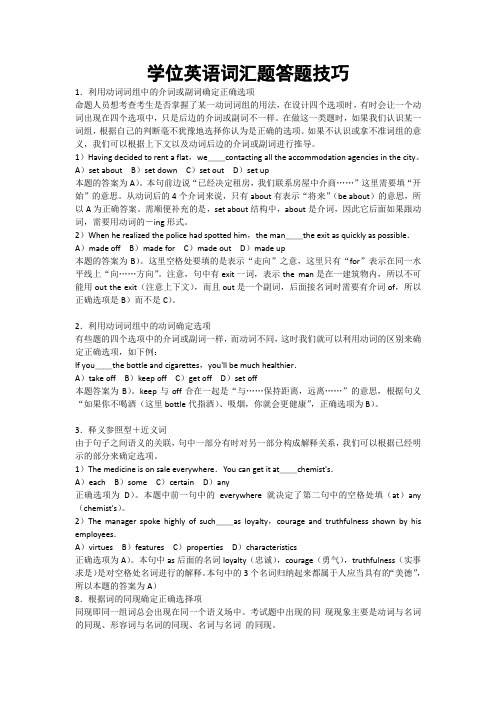
学位英语词汇题答题技巧1.利用动词词组中的介词或副词确定正确选项命题人员想考查考生是否掌握了某一动词词组的用法,在设计四个选项时,有时会让一个动词出现在四个选项中,只是后边的介词或副词不一样。
在做这一类题时,如果我们认识某一词组,根据自己的判断毫不犹豫地选择你认为是正确的选项。
如果不认识或拿不准词组的意义,我们可以根据上下文以及动词后边的介词或副词进行推导。
1)Having decided to rent a flat,we__contacting all the accommodation agencies in the city。
A)set about B)set down C)set out D)set up本题的答案为A)。
本句前边说“已经决定租房,我们联系房屋中介商……”这里需要填“开始”的意思。
从动词后的4个介词来说,只有about有表示“将来”(be about)的意思,所以A为正确答案。
需顺便补充的是,set about结构中,about是介词,因此它后面如果跟动词,需要用动词的-ing形式。
2)When he realized the police had spotted him,the man__the exit as quickly as possible.A)made off B)made for C)made out D)made up本题的答案为B)。
这里空格处要填的是表示“走向”之意,这里只有“for”表示在同一水平线上“向……方向”。
注意,句中有exit一词,表示the man是在一建筑物内,所以不可能用out the exit(注意上下文),而且out是一个副词,后面接名词时需要有介词of,所以正确选项是B)而不是C)。
2.利用动词词组中的动词确定选项有些题的四个选项中的介词或副词一样,而动词不同,这时我们就可以利用动词的区别来确定正确选项,如下例:If you__the bottle and cigarettes,you'll be much healthier.A)take off B)keep off C)get off D)set off本题答案为B)。
学位英语解题技巧

解题技巧一、阅读掌握所读材料的主旨和大意;了解说明主旨和大意的事实和细节;既理解字面的意思,又能根据所读材料进行一定的判断和推论;既理解个别句子的意义,又能在一定程度上理解上下文的逻辑关系。
题材广泛,包括人物传记、社会、文化、日常知识、热门话题及科普常识;体裁多样,基本上以表达、说明文为主;题量不是很大,自2003年11月起,三篇阅读总量大概900词左右,共15个题,要求选出最正确答案。
自2003年起,所涉及的题材分别为语言与教育〔〕、社会与环境〔〕、生态与能源〔2004.4,2004.4,2005.11,〕、体育与健康〔〕、农业与经济〔〕和科普〔〕。
1.2难易分布规律从上面不完全统计可以看出,题材大致分布在语言与教育、科普和生态与能源三个方面,难易的等级基本上是从“易、稍难到难”来分布的,且词汇量有不断增长的趋势〔详见下面历年生词表〕。
从历年的生词分布情况来看,阅读部分的词汇量有逐年增加的趋势,且材料的语言越来越偏于抽象化。
这样考生在备考过程中,应该有所发觉,并进行有针对性的准备。
特别是2008年的第一篇阅读,难度比较大,望考生在准备过程中能广泛阅读不同英文材料。
1.4出题走向近年来,特别是从2003年题型调整以来,学位考试阅读出题的主题基本上都与当前的社会发展息息相关,并不断地融入语言交际背景知识与社会文化知识,这反映出英语测试越来越注重在社会交际和实际运用中来考查学生的英语能力。
近年来的出题主题基本上集中在语言〔教育、手势语、智力〕、社会〔电视、工作与提升、物质与生活健康〕、生态能源与经济等方面。
针对阅读理解的题型和测试点,答题通常采用如下几种基本方法:根据试题要求到文章中去寻找相应的信息。
但找信息时要注意:〔1〕题目与文章段落的对应位置〔一般来说题目的顺序与文章段落的顺序是一致的〕。
通常第一题在文章开头的一、二段里找到的可能性大,或是每个段落的开头;而最后一题的答案在文章的结尾或后半部分找到的可能性最大。
- 1、下载文档前请自行甄别文档内容的完整性,平台不提供额外的编辑、内容补充、找答案等附加服务。
- 2、"仅部分预览"的文档,不可在线预览部分如存在完整性等问题,可反馈申请退款(可完整预览的文档不适用该条件!)。
- 3、如文档侵犯您的权益,请联系客服反馈,我们会尽快为您处理(人工客服工作时间:9:00-18:30)。
第一课固定搭配的错误英语中的固定搭配有动词、形容词、名词同介词的搭配以及许多惯用法等。
看下面的例子:1.N e i t h e r J o h n a n d h i s f a t h e r w a s a b l e t o w a k e u pA Be a r l y e n o u g h t o c a t c h t h e m o r n i n g t r a i n.C D解析:答案为A。
n e i t h e r…n o r…既不…也不…,是固定搭配。
2.A s t i m e w e n t o n,h e s u f f e r e d s u c h h e a vy l o s s e sA B Ct h a t h e w a s f o r c e d g i v i n g u p h i s b u s i n e s s.D解析:答案为D。
b e f o r c e d t o d o s t h:被迫做…,要接不定式。
因此应改为t o gi v e u p第2课代词、替代词的错误解题的时候要看清楚句子中的代词有没有前后矛盾的地方,比如前面是我们we,但是后面的宾格却用了them(应该改为us)。
请看例句:1.(Those of us) who work in (laboratories) should have (their) lungs (checked) quite regularly.解题:错处是their。
应改为our,代指前面的those of us。
2.Mary showed (the customs) officer her passport, and (then) John showed (him) (his one).接替:答案为his one。
应改为his,his本身可以作名词性的物主代词,不需要再用one了。
第3课连接词的错误句子中的从句有很多种,这时候就要看清楚是何种从句,从而决定连接词用得对与否。
例:1.Mary found it (difficult) to talk (calmly) about (which) she had (experienced) at the station.接替:答案为which。
应该改为what。
About后面的是一个宾语从句,引导词不用which。
2.The United States (is composed) of fifty states, (two of those) are (separated from) (the others) by land or water.解题:答案为two of those,应该改成two of which。
后半句其实是一个非限定性的定语从句,不能用those。
第4课主谓一致方面的问题,主要表现为数的不一致。
例:1.The salesman told me (that) a good pair of glasses (were) supposed (to last) (at least) 3 to 4 years.解题:答案为were,改为was。
A good pair of glasses做主语,动词应为单数,和pair呼应。
2.The news (coming from) (different parts) of the world (are) often (extremely discouraging) these days.接替:答案为are,改为is。
News形式上是复数,但谓语动词得用单数。
第5课语态和时态方面的问题例:1.The development of industry has (also) brought (about) large numbers of problems (which)have (to solve).接替:答案为to solve,应改为to be solved。
因为solve和它的逻辑主语problems之间是动宾关系,问题是被解决的,所以用被动的形式。
2.(Ever since) the world (began), nations (have difficulty) (in keeping) peace with their neighbors. 解题:答案为have difficulty,应改为have had difficulty。
因为ever since引导句子的时候,从句用过去时,主句要用现在完成时。
第6课平行结构的错误在英语的句式中,并列连词如and等前后的结构应该是相同的,这就是平行结构。
例:1.You (had better) (return to) your dormitory and (to enjoy) the company of your roommates instead of (wasting) time with me.答案为to enjoy,应改为:enjoy。
因为enjoy 和return 并列,都跟在had better 后面,要用动词的原形2.She was (angry), went (out), and (slamming) the door (behind) her.解题:答案为slamming。
应改为slammed, 因为句中,went out 和slammed 并列。
第7课倒装方面的错误英语中有一些情况下,主语和谓语是要求倒装的,比如否定结构放在句首的时候,虚拟语气中把if省略掉了的时候,做这类题目的时候,要熟记此类语法才行。
例:1.(under) no circumstances (we shall) stop (the) research (we have) begun.解题:答案为B, 应改为shall w e。
因为前面是否定词组under no circumstances放在句首,后面的主谓要倒装。
2.(they had) come here (earlier), they (wouldn’t) (have missed) the train.解题:they had应改为had they。
根据后半句的句式,明显得知这是一个虚拟语气,而前半句又省略了if,则they had要倒装。
第8课虚拟语气方面的错误虚拟语气有很多种形式,考试中也极易考到此类语法的辨错题。
例:1.(It is) important (that) she (goes) to see the doctor (immediately).解题:此句中goes是错的,有些形容词如important后面的从句用特殊的虚拟语气,形式为should+动词原形,而且should可以省略。
所以此题的正确用法应当是go或者should go。
2.(If) you (had come) to the party last night, you (have known) (the) fact.解题:have known应改为would have known,因为根据前半句的意思得知这是对过去事情的虚拟,所以后半句的形式应改为would have known。
第9课语义的肯定与否定有些时候句子里揉合很多的否定结构,这是一定要看清楚整个句子的意思是肯定的还是否定的例:1. Our history professor is (such) a (knowledgeable) person that (it seems) that there isn’t (nothing) which he (does not) know.解题:此句中nothing是错的。
前半句还在夸历史学教授知识渊博,到了后半句突然变得不学无术了。
nothing应改成anything。
2.You (shouldn’t) be (so) worried, (and) you know that (anybody) here would not help you.解题:anybody改为nobody,后半句意思是:这里没有人不愿意帮你。
第10课挑错总结挑错题解题套路第一步:分析句子的结构,找出句子的主要成分(主语、谓语、宾语等),看懂句子的意思。
弄清划线的四个部分分别在句中大致充当的语法成分。
第二步:过滤错误1.划线部分如果是主语或者谓语,则要考察主谓搭配有无错误(主语和谓语的性数搭配)。
还要考察谓语动词的时态有无错误。
2.划线部分如果是代词,则要考察代词与其指代的名词之间有无错误。
3.划线的部分如果是动名词或者分词结构或者不定式结构,则要考察它们的用法有无错误。
4.划线的部分如果和句中的从句有关系(主要是名词性从句或定语从句),则要考察从句的引导词有无错误;对于该从句还要重复上面1、2、3的过滤步骤。
5.划线的部分如果是特定的语法结构,比如强调句,倒装句,虚拟语气,情态动词表示判断,反意疑问等,则要考察这些结构的用法有无错误。
6.划线的部分如果是固定词组,则要考察该词组是否有误。
第三步:得出答案例题On her way to the supermarket yesterday morning Mary met an old friend and stopped talkingA B Cwith him for quite a while. (1992年学位英语考试第63题)D解题步骤:第一步:本句的主语是Mary,谓语动词是met和stopped,对应的宾语分别是an old friend 和talking with him。
本就大意是“昨天早晨在去超市的路上,Mary遇到了一个老朋友就停下来和他聊了很长时间。
A是状语,B是谓语动词,C是谓语动词,D是状语。
第二步:过滤错误1.A是一个固定词组,源自“on one’s way to+地点”,所以此处并无错误。
2.B和C都是谓语动词,时态是一致的,都是一般过去式,所以时态上并无错误。
C源自一个固定词组“stop doing”,其意思是“停止做某事”。
据此,我们可以知道“stopped talking with him”的真正意思是“停止和他的聊天”,这是不符合句意的,所以可知错误就在此处。
我们可以将之改成“stopped to talk with him”(停下来去和他谈话)。
这里用到了另一个词组“stop to do”,其意思是“停下来去做某事”。
3.D是一个固定词组,它的意思是“好一会,很长时间”,这个词组没有错误。
第三步:答案是C习题1. He invited me to go to a party and I did not want to join him that evening.A B C D[1]C第一步:本句有两个分句组成,中间用and连接。
